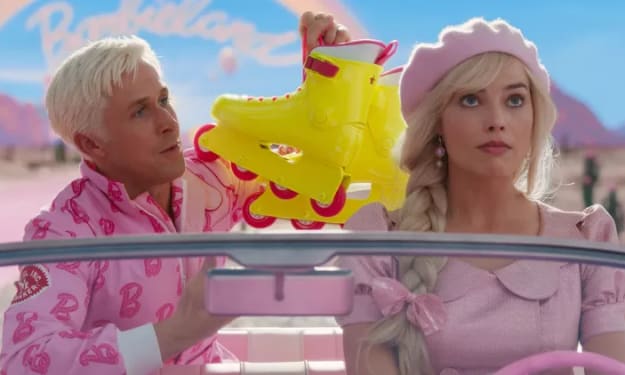Five stars for I'm Thinking of Ending Things
A new film from the writer of Being John Malkovich and Adaptation is like a creepy and dark reworking of Meet the Parents – it’s his weirdest yet

Imagine if Meet the Parents was remade by the writer of Being John Malkovich, Adaptation and Eternal Sunshine of the Spotless Mind, and by the writer-director of Synecdoche, New York and Anomalisa, and you’ll have a fair idea of what to expect from Charlie Kaufman’s I’m Thinking of Ending Things. To put it another way, you won’t really know what to expect at all, because Kaufman’s films are always weirder, gloomier, and more unsettling than you might assume, and his latest, adapted from a novel by Iain Reid, could be the weirdest of them all.
The premise is as straightforward as it is in the Ben Stiller comedy. Twenty-something Lucy (Jessie Buckley, the vivacious star of Beast, Wild Rose and Misbehaviour) and Jake (Jesse Plemons), her boyfriend of a few weeks, drive out of a city and into the snowy countryside to meet his parents, Toni Colette and David Thewlis. At the family farm, they are served dinner, and Jake’s parents embarrass him with proud reminiscences of his schooldays before they drive off again. Simple. This being a Kaufman film, though, nothing is as it should be. It’s not that anyone behaves outrageously or threateningly. It’s just that everything is... wrong. Scenes go on far longer than expected, dialogue overlaps with internal monologues, characters recite lengthy poems and even film reviews by heart. In all sorts of small ways that make most films seem staid, Kaufman establishes that we are in an uncanny, decidedly creepy parallel universe.
Even the drive to the farm is a purgatory of low-level irritation in which the supposedly loved-up young couple can never agree on anything or find a conversational rhythm. Lucy tries to retreat into her thoughts about their wobbly relationship – hence the title. The hunched, stocky, faintly aggressive Jake – who resembles the star of Synecdoche, New York, Philip Seymour Hoffman – can’t stop butting in with his views on Wordsworth and musical theatre. They sit next to each other, but Kaufman cuts back and forth between them, rather than putting them both in the same frame, so we can see how disconnected they are. And, like them, we can’t relax.
The film is rich in detail and ideas, and it comes from a unique, uncompromising talent
Once they reach the remote farm, Jake insists on giving Lucy a tour of the outbuildings before they go into the house, a tour that includes some lambs that have frozen to death in a barn, and the spot where a pig was eaten alive by maggots. Then comes the dinner, a glutinous spread that seems simultaneously generous and disgusting, but no one ever touches the food. That’s just the beginning of the strangeness. Jake’s parents, played unnervingly well by Colette and Thewlis, are like alien robots who have been programmed to behave like human beings, but keep glitching. People grow decades older and younger as the evening goes on, as if Lucy is realising that, if she stays with Jake, she will be stuck with his past and his distant future. And Lucy herself is prone to such transformations. Buckley (who is, incidentally, better at accents than any other actor in the business) makes her believable and likeable throughout, but her clothes, her occupation and even her name change without anyone acknowledging what’s happening. Is she a poet or a painter? Is she studying physics or gerontology? Is she actually called Lucy? Or is it Lucia or Louisa or something else altogether?
Whatever she is called, she is clearly uncomfortable with the situation, but she goes along with it, just as you do in a dream where you’re in an awful predicament but you can’t walk away. Or maybe the film is a memory, and Kaufman is showing how different people remember the same events differently. Or maybe the metamorphoses are – as in Adaptation – a comment on the screenwriting process, and the way that characters’ identities are revised as the writer drafts and redrafts the script.
Or maybe... well, I’m Thinking of Ending Things could prompt ‘maybes’ like that for years. Beyond Kaufman’s own oeuvre (and Meet the Parents), it’s most reminiscent of two of Stanley Kubrick’s most infinitely interpretable films, The Shining and 2001: A Space Odyssey. The Shining is definitely lurking behind the snowy scenes and the tendency to cut away from the couple to a school janitor, just as Kubrick cuts away from the Torrances to the Overlook Hotel’s chef; the 2001 influence becomes obvious in later, psychedelic scenes that I won’t spoil by describing. I’m not saying that Kaufman’s film will be enshrined as a classic, as those Kubrick films are. It’s too idiosyncratic and demanding for that: many viewers will be thinking of ending it halfway through. But, like those films, it is rich in detail and ideas, and it comes from a unique, uncompromising talent who likes to leave some loose ends for the viewer to tie up.
Still, the film isn’t just a horror drama and an intellectual puzzler. Sometimes it is hilarious: sudden references to Billy Crystal and Robert Zemeckis made me laugh out loud. And sometimes it is heart-wrenchingly moving. I’m Thinking of Ending Things draws constant attention to its own artifice, and to the things that can only happen in films. But it seems completely sincere in its concern about ageing, illness, pain, regret, and the connections we make to art and other people. Whichever universe it may be set in, it has a lot to say about our own.
About the Creator
Cindy Dory
When you think, act like a wise man; but when you speak, act like a common man.






Comments
There are no comments for this story
Be the first to respond and start the conversation.